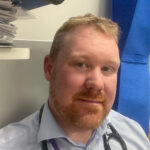By Dr Joseph Hawkins, Consultant in Palliative Medicine, Clinical lead for End of Life Care, Ashford and St Peter’s NHS Foundation Trust. Twitter: @JoeHawk75825077

Last night I dreamed of a consultation. It wasn’t a real patient that I was recalling but rather an amalgamation of patient stories from the day that had infiltrated my subconscious. Dream phantoms formed of those projections of emotional force such that my psyche found itself sweating over the details during my downtime. It’s an intense thing, talking to people about dying. Perhaps it’s no surprise then that I was tussling with the best formulation of language and approach with my spectral passenger long after I’d stopped my day time interactions with the waking world. Yet it made me think. I sometimes look back and consider that what I do now I have learned so well there are aspects of it that I describe in my more over confident moments as being able to do in my sleep. I hadn’t thought of it literally, yet there was the proof that perhaps I should.
During my more serious moments of contemplation was the realisation that these serious discussions about life and medicine have become an aspect of who I am, not just who I am at work. I don’t view these conversations as work, or at least not just work. Talking about what is to come, the careful negotiation of the untrodden paths of the unknown; each discussion as unique to its bearer as the faces of beauty on canvas in an art gallery. This work/not work, has become a part of me. I know that I sometimes come across as distracted when making small talk because a part of my self is having a conversation that I first had a few days ago. These conversations are abstract things- they weigh infinite nothing- the weight of a word or a phrase yet we all know that the impact when they land is such that if gotten wrong those weightless words have the capacity to torture the recipient more than any physical pain. Perhaps more importantly is if I get it right, or at least right enough, then I will do what I hoped for when I first qualified and I may ease another’s suffering. The longer I’ve been qualified the clearer it has become that easing suffering is a lot harder than it seemed when I was a medical student. A little or a lot is never mine to measure but whatever the benefit I hope that I may help despite the most challenging of times.
It seems to me that this is worth my night time ramblings and distracted moments, although I wish someone had shared with me earlier on in my career, what I have shared here in this article. Informed consent to enter training, perhaps.
I don’t think it would have altered my decisions but I suspect that I would have found the transition in to palliative medicine more wholesome if I’d known what I know now. Future career planning rather than future care planning. As many of us have learned and all of us will learn, the difference between doctor and patient is only a matter of perspective.
I’ve written before that palliative care is the map, not the destination. I have tried for a while to embody this sense of broader perspective as a supervisor to doctor colleagues. Unfortunately it seems to me that increasingly training of doctors is about destination and this has put many doctors in a position where they don’t feel engaged with the process of training. I know that I would have been helped by more experienced colleagues talking to me as a person rather than as a trainee. It would have helped me to accept and embrace the changes that my choice of career have made upon me. I am at peace with myself most days and appreciate the person my career has helped me become but the journey has not been smooth, I hope that some reading this will see it as helpful for trainees, and as leaders.
Also by this Author:
Be complex, be palliative
The well
The rock and the crime.